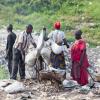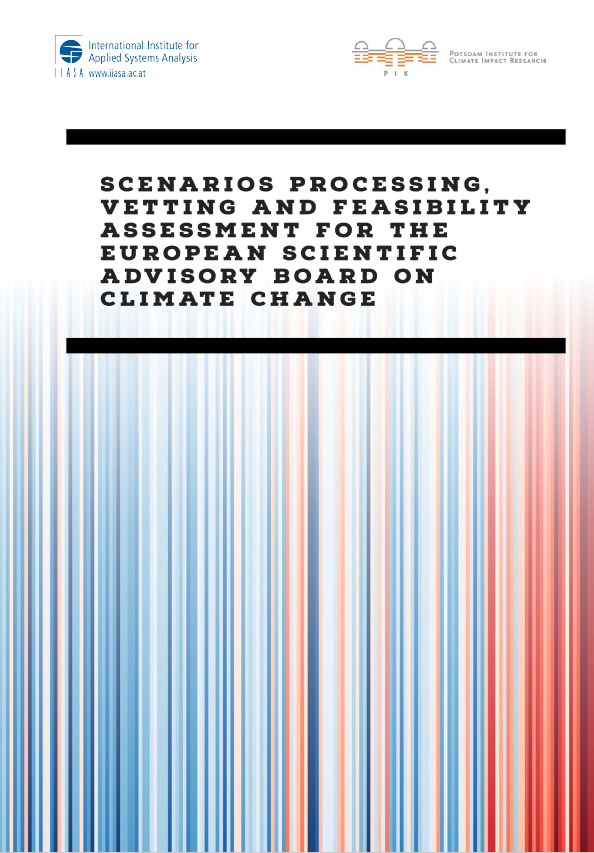
Today, the European Advisory Board on Climate Change officially published advice to the European Commission, presenting evidence for a 2040 greenhouse gas (GHG) emissions target, which was substantially informed by an analysis conducted by IIASA.
Cover of the new IIASA-PIK report detailing the analysis provided to the Advisory Board. The blue and red climate stripes illustrate the global warming that has occurred over Europe between 1850-2022.
In two new reports, IIASA researchers, with support from colleagues at the Potsdam Institute for Climate Impact Research (PIK), examined the feasibility and fairness of emissions targets and considerations for the European Climate Law. Keywan Riahi, a member of the 15-strong EU Advisory Board and IIASA Energy, Climate, and Environment Program Director, took the lead in conducting the analyses.
The European Scientific Advisory Board on Climate Change is an independent board entrusted with the crucial responsibility of providing transparent and scientific guidance to the EU on setting a new emissions reduction target to be achieved by 2040, as well as budgets for greenhouse gas emissions within the EU from 2030 to 2050. This guidance should align with other global commitments, including the Paris Agreement.
“The Advisory Board has recommended that the EU should reduce greenhouse gas emissions by 90-95% by 2040 relative to 1990 levels, having identified pathways that are fair, feasible, and consistent with the EU’s climate commitments. The feasibility and fairness of the Advisory Board’s advice have been substantially informed by two IIASA reports published this week and builds on a long history of hosting climate, emissions, and energy data for the research community, and transparently supporting scientific assessments and policy advice such as the latest IPCC report,” states Riahi, who is also the lead author of various IPCC reports.
“From a total of 63 scenarios that were compatible with the target of 1.5°C and the European Climate Law, 27 scenarios were identified with high feasibility concerns. This left us with 36 scenarios that were recommended for further analysis by the Advisory Board,” says author Elina Brutschin, a researcher in the Transformative Institutional and Social Solutions Research Group in the IIASA Energy, Climate, and Environment Program.
The database and evaluation of different scenarios form a solid and transparent foundation for the Advisory Board’s recommendations to the EU on reducing emissions. These recommendations are expected to become a part of EU law later this year. IIASA researchers have additionally released a report examining the fairness and equity considerations to the EU’s mitigation challenge.
“There are long-standing debates surrounding countries’ historical responsibility for global warming, as well as vulnerability to impacts and the ability to pay for mitigation. The analysis supports a discussion of Europe’s “fair share” and responsibility, that will help determine the EU’s climate ambition both within the EU as well as in international climate negotiations in alignment with the normative principles to which the European Union ascribes,” says Setu Pelz, a researcher in the same group at IIASA.
“The findings presented in these reports underscore the importance of ambitious emissions reductions and climate leadership by the EU in responsibly mitigating emissions and limiting the impacts of climate change. This will bring significant and transformative changes to how people live, the economy, and the environment in the EU,” concludes author Edward Byers, a researcher in the Integrated Assessment and Climate Change Research Group.
References
Byers, E., Brutschin, E., Sferra, F., Luderer, G., Huppmann, D., Kikstra, J., Pietzcker, R., Rodrigues, R., & Riahi, K., 2023. Scenarios processing, vetting and feasibility assessment for the European Scientific Advisory Board on Climate Change. International Institute for Applied Systems Analysis, Laxenburg. https://pure.iiasa.ac.at/18828
Pelz, S., Rogelj, J., Riahi, K., 2023. Evaluating equity in European climate change mitigation pathways for the European Scientific Advisory Board on Climate Change. International Institute for Applied Systems Analysis, Laxenburg. https://pure.iiasa.ac.at/18830
News

05 June 2024
The 2024 State of CDR Report: Scaling up CO2 removal to meet Paris Targets

23 April 2024
US Permanent Representative to International Organizations in Vienna visits IIASA

15 April 2024





